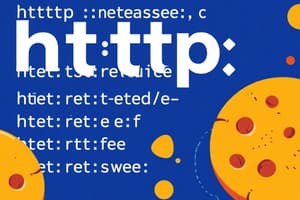Podcast
Questions and Answers
What type of cookie is deleted when the browser is closed?
What type of cookie is deleted when the browser is closed?
- Session Cookie (correct)
- First-Party Cookie
- Third-Party Cookie
- Persistent Cookie
What is the primary function of authentication cookies?
What is the primary function of authentication cookies?
- To store user preferences
- To protect user data
- To verify user identity (correct)
- To track user behavior
What component of a cookie specifies the URL path it is valid for?
What component of a cookie specifies the URL path it is valid for?
- Expiration Date
- Domain
- Secure
- Path (correct)
What security concern involves the unauthorized access to cookies?
What security concern involves the unauthorized access to cookies?
What type of cookie is set by a website other than the one being visited?
What type of cookie is set by a website other than the one being visited?
What is the purpose of the HttpOnly flag in a cookie?
What is the purpose of the HttpOnly flag in a cookie?
Flashcards are hidden until you start studying
Study Notes
Types of Cookies
- Session Cookies: temporary cookies that are deleted when the browser is closed
- Persistent Cookies: remain on the user's device until they expire or are manually deleted
- First-Party Cookies: set by the website being visited
- Third-Party Cookies: set by a website other than the one being visited
Cookie Functions
- Authentication: verify user identity and maintain login sessions
- Personalization: store user preferences and tailor the user experience
- Tracking: monitor user behavior and collect data for analytics and advertising
- Security: prevent fraud and protect user data
Cookie Components
- Name: a unique identifier for the cookie
- Value: the data stored in the cookie
- Expiration Date: the date and time the cookie will expire
- Domain: the domain or website that set the cookie
- Path: the URL path the cookie is valid for
- Secure: indicates whether the cookie should be transmitted over a secure connection
- HttpOnly: indicates whether the cookie should be accessible to JavaScript
Cookie Security Concerns
- Cross-Site Scripting (XSS): injection of malicious scripts to access or steal cookies
- Cross-Site Request Forgery (CSRF): unauthorized actions performed on a user's behalf using cookies
- Cookie Theft: unauthorized access to cookies, potentially leading to identity theft or data breaches
Types of Cookies
- Session cookies are temporary and deleted when the browser is closed.
- Persistent cookies remain on the user's device until they expire or are manually deleted.
- First-party cookies are set by the website being visited.
- Third-party cookies are set by a website other than the one being visited.
Cookie Functions
- Authentication verifies user identity and maintains login sessions.
- Personalization stores user preferences and tailors the user experience.
- Tracking monitors user behavior and collects data for analytics and advertising.
- Security prevents fraud and protects user data.
Cookie Components
- A cookie has a unique name, which identifies it.
- The value is the data stored in the cookie.
- The expiration date is the date and time the cookie will expire.
- The domain is the domain or website that set the cookie.
- The path is the URL path the cookie is valid for.
- The secure flag indicates whether the cookie should be transmitted over a secure connection.
- The HttpOnly flag indicates whether the cookie should be accessible to JavaScript.
Cookie Security Concerns
- Cross-Site Scripting (XSS) involves the injection of malicious scripts to access or steal cookies.
- Cross-Site Request Forgery (CSRF) involves unauthorized actions performed on a user's behalf using cookies.
- Cookie theft can lead to identity theft or data breaches.
Studying That Suits You
Use AI to generate personalized quizzes and flashcards to suit your learning preferences.




